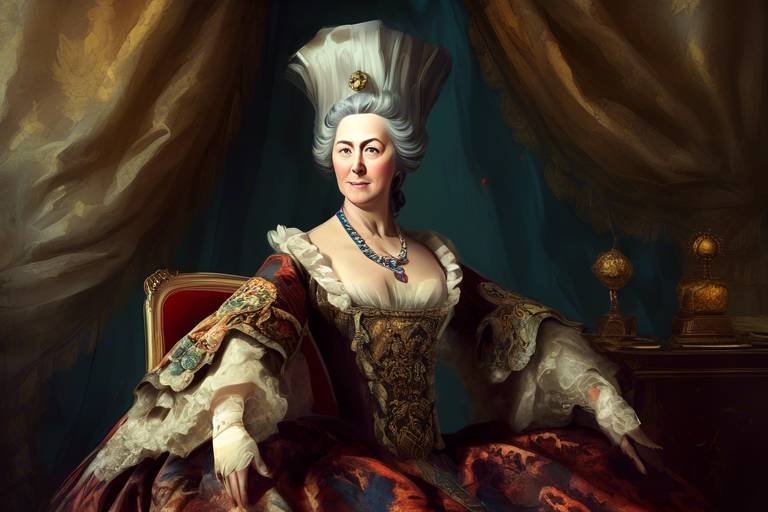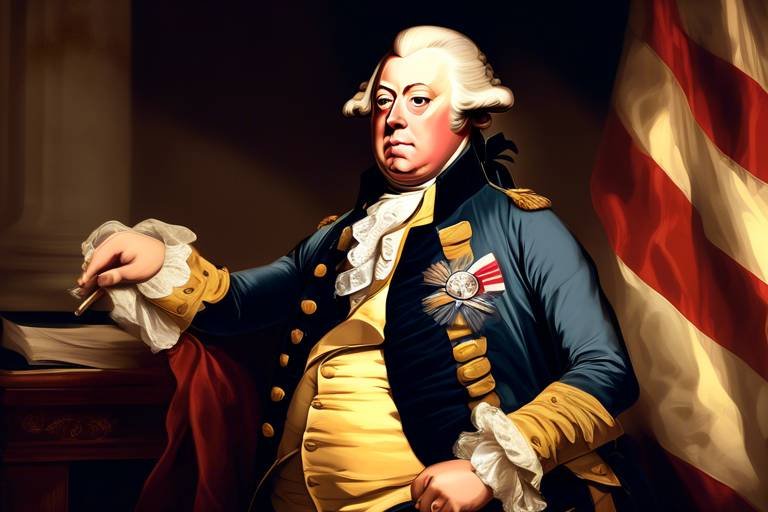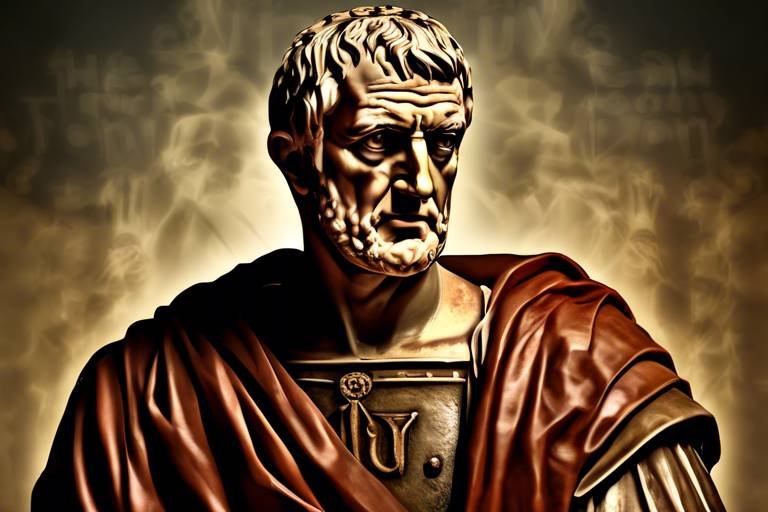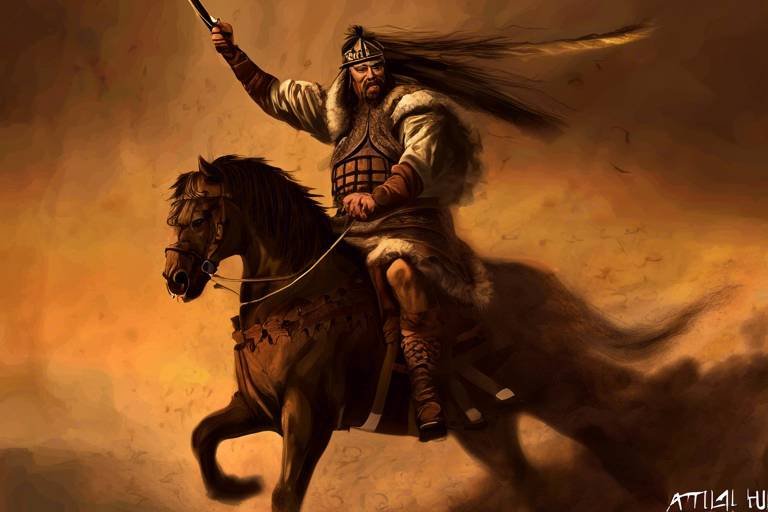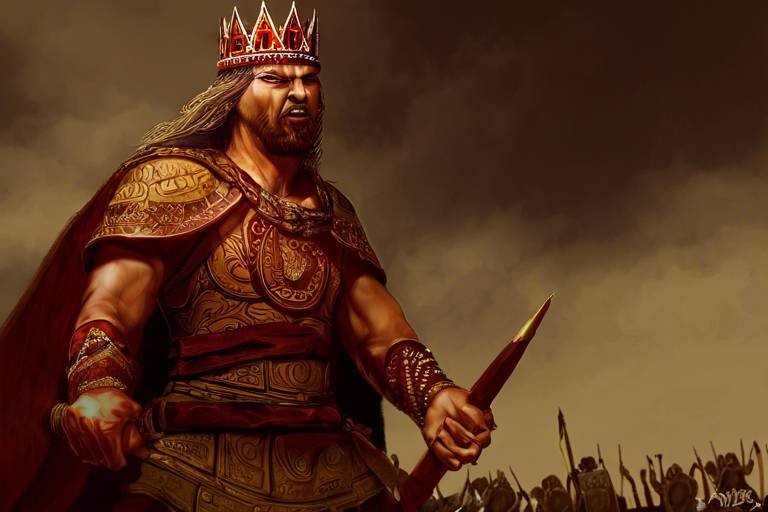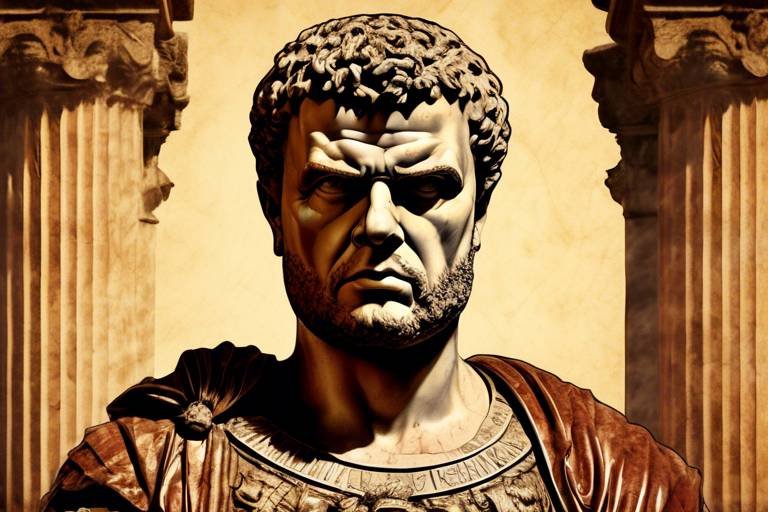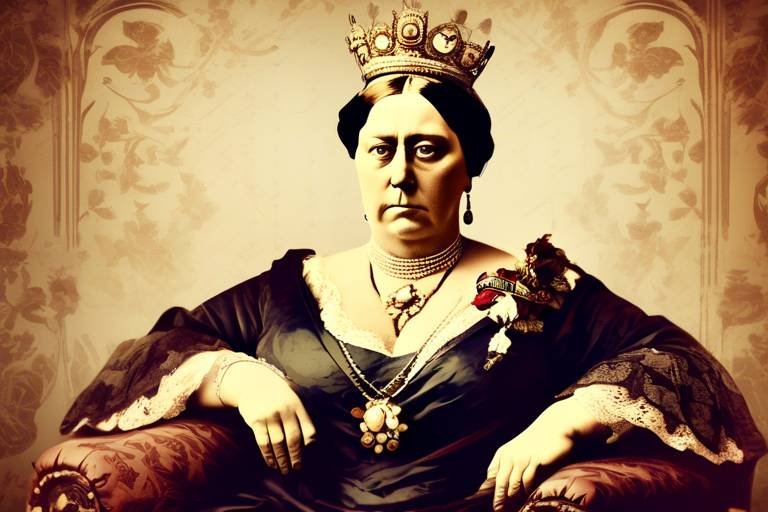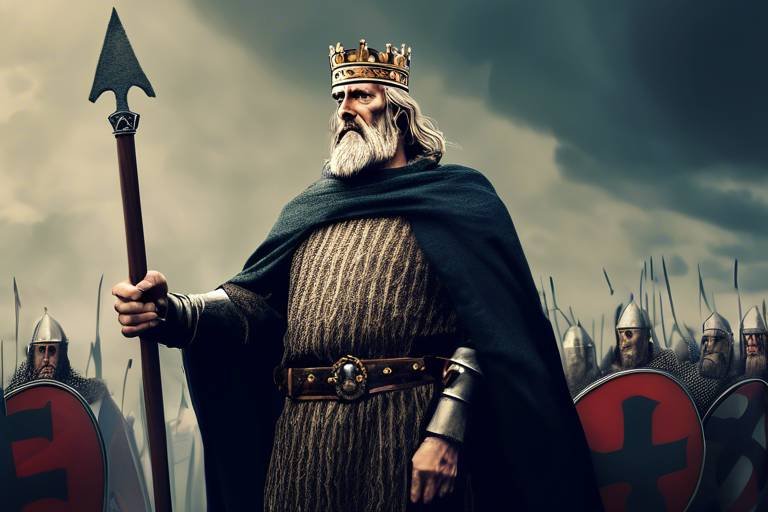Heraclitus: The Philosopher of Change
Heraclitus, known as the Philosopher of Change, stands out in the annals of ancient Greek philosophy for his profound insights into the nature of existence. His teachings revolve around the fundamental principle that change is the essence of the universe, and that everything is in a constant state of flux. Heraclitus believed in the unity of opposites, viewing contradictions as essential components of harmony and balance.
Delving into the life and philosophy of Heraclitus unveils a world of paradoxes and enigmatic wisdom. His doctrine of flux, encapsulated in the phrase panta rhei or "everything flows," emphasizes the impermanence and transitory nature of all things. According to Heraclitus, stability is an illusion, and the only certainty is change.
Fire occupies a central role in Heraclitus' cosmology, symbolizing transformation and the perpetual cycle of creation and destruction. He posited that fire is the primary element from which all things emerge and to which all things return, embodying the dynamic nature of existence.
One of Heraclitus' key concepts is the unity of opposites, asserting that conflicting forces are interconnected and interdependent. This notion underpins his philosophy of harmony through tension, suggesting that contradictions are essential for the balance and order of the cosmos.
Heraclitus' writings are characterized by their cryptic and fragmentary nature, often presented in paradoxical aphorisms that challenge conventional modes of thought. His concept of logos, the rational principle governing the universe, offers a glimpse into his belief in an underlying order and reason that permeates all existence.
The enduring influence of Heraclitus on Western philosophy is undeniable, with his ideas resonating through the centuries and shaping the intellectual landscape of subsequent generations. His legacy continues to inspire contemplation and debate, fueling ongoing discussions about the nature of reality and the essence of change.
As we navigate the complexities of Heraclitus' philosophy, we are confronted with a tapestry of interpretations and controversies that highlight the multifaceted nature of his teachings. The reception of his ideas varies widely among scholars and philosophers, reflecting the enduring enigma and relevance of the Philosopher of Change.

Early Life and Background
Exploring the life and philosophy of Heraclitus, an ancient Greek philosopher known for his doctrines on change and the unity of opposites. Dive into his famous quotes and beliefs that continue to influence modern philosophical thought.
Discovering the historical context and upbringing of Heraclitus is like unraveling the threads of a complex tapestry. Born in the city of Ephesus, situated in the ancient Greek region of Ionia, Heraclitus belonged to a noble family. His aristocratic background provided him with the privilege of education and exposure to various intellectual influences of his time.
Despite his affluent upbringing, Heraclitus was known for his solitary nature, often spending long hours in deep contemplation by the banks of the river Meander. It was during these moments of solitude that he began to formulate his revolutionary ideas about the nature of reality and the essence of existence.
Growing up in a society marked by political turmoil and cultural diversity, Heraclitus was exposed to a melting pot of ideas and beliefs. The vibrant atmosphere of Ionia, known for its flourishing trade and intellectual exchange, played a significant role in shaping Heraclitus' philosophical outlook.
As a young man, Heraclitus traveled extensively, seeking wisdom from different schools of thought and engaging in philosophical discourse with scholars and thinkers of his time. These interactions broadened his intellectual horizons and deepened his understanding of the complexities of the universe.
In essence, Heraclitus' early life and background laid the foundation for his later philosophical pursuits, setting the stage for his profound insights into the ever-changing nature of the world and the interconnectedness of all things.

Doctrine of Flux
Heraclitus, the enigmatic philosopher of change, introduced the profound concept of panta rhei, which translates to "everything flows." In his philosophical framework, Heraclitus posited that change is not only inevitable but is the very essence of existence itself. Just as a river constantly flows and changes, so does the universe in a perpetual state of flux.
According to Heraclitus, all things are in a state of constant motion and transformation, with nothing ever staying the same. This dynamic view of the world challenges traditional static notions and invites us to embrace the fluidity and impermanence of life. The doctrine of flux underscores the interconnectedness of all phenomena, emphasizing the interplay between opposites and the cyclical nature of reality.
For Heraclitus, change is not to be feared but embraced as an inherent part of the natural order. Just as the seasons change and the tides ebb and flow, so must we adapt and evolve in harmony with the ever-changing world around us. Through his doctrine of flux, Heraclitus invites us to embrace change as a fundamental aspect of growth and renewal.

panta rhei
Heraclitus' concept of panta rhei, meaning "everything flows," encapsulates his fundamental belief in the perpetual nature of change. According to Heraclitus, the universe is in a constant state of flux, with everything in motion and nothing staying the same. This notion challenges the traditional view of a static and unchanging world, emphasizing the dynamic and interconnected nature of reality.
Imagine a river constantly flowing, never stagnant, always evolving. Heraclitus uses this analogy to illustrate his philosophy of panta rhei, where change is not only inevitable but essential for growth and transformation. Just as one cannot step into the same river twice, one cannot experience the same moment in time twice, highlighting the transient nature of existence.
For Heraclitus, embracing change is not a sign of instability but a recognition of the inherent order and harmony in the universe. The interconnectedness of all things, the ebb and flow of creation and destruction, reflects the dynamic balance that underlies the fabric of reality. Through panta rhei, Heraclitus invites us to embrace the fluidity of life and find meaning in the ever-changing nature of the world.

or everything flows, delving into his belief that change is the only constant in the universe.
Exploring the life and philosophy of Heraclitus, an ancient Greek philosopher known for his doctrines on change and the unity of opposites. Dive into his famous quotes and beliefs that continue to influence modern philosophical thought.
Discover the historical context and upbringing of Heraclitus, shedding light on how his environment and experiences shaped his unique philosophical perspectives.
Explore Heraclitus' central concept of panta rhei or everything flows, delving into his belief that change is the only constant in the universe.
Understand Heraclitus' idea that opposites are interconnected and dependent on each other, leading to a deeper understanding of his philosophy of harmony through tension.
Unpack Heraclitus' theory that fire is the fundamental substance of the universe, symbolizing transformation and the continuous process of creation and destruction.
Examine the enigmatic style of Heraclitus' writings, characterized by cryptic aphorisms and paradoxes that challenge traditional modes of thinking.
Analyze Heraclitus' concept of logos as the underlying order and reason governing the cosmos, offering insights into his views on the nature of reality.
Trace the impact of Heraclitus' ideas on subsequent philosophical movements and thinkers, highlighting his enduring legacy in shaping the intellectual landscape of the Western world.
Investigate the diverse interpretations and controversies surrounding Heraclitus' philosophy, showcasing the ongoing debates and evolving perspectives on his contributions to philosophical thought.

Unity of Opposites
Heraclitus' doctrine of the unity of opposites is a fundamental aspect of his philosophical framework, emphasizing the interconnected nature of seemingly contradictory elements in the world. According to Heraclitus, opposites such as hot and cold, day and night, and life and death are not separate entities but rather complementary forces that exist in harmony. Just as a magnet has two poles that attract each other, Heraclitus believed that opposites attract and rely on each other for existence.
This concept can be likened to the ebb and flow of the tides, where the rising and falling of the water represent the cyclical nature of opposing forces in constant motion. Heraclitus saw this tension between opposites as essential for maintaining balance and order in the universe, much like the push and pull of a tug-of-war game where both sides are necessary for the game to function.

Fire as the Primary Element
Heraclitus, the enigmatic ancient Greek philosopher, proposed a profound theory regarding the primary element of the universe - fire. In his philosophical framework, fire symbolizes not only physical flame but also the transformative essence that underlies all existence. According to Heraclitus, fire represents the perpetual cycle of creation and destruction, highlighting the dynamic and ever-changing nature of the cosmos.
For Heraclitus, fire is not merely a material substance but a symbol of constant flux and transformation. Just as fire consumes and renews, the universe undergoes continuous processes of change and renewal. This concept of fire as the primary element reflects Heraclitus' belief in the interconnectedness of all things and the cyclical nature of reality.
Moreover, Heraclitus viewed fire as a symbol of purification and enlightenment. Just as fire purifies metal by removing impurities, the transformative power of fire in the universe purges and refines the world, leading to growth and evolution. In this sense, fire embodies the driving force behind all change and progress, guiding the universe towards a state of higher order and harmony.

Obscure and Fragmentary Writing
Exploring the life and philosophy of Heraclitus, an ancient Greek philosopher known for his doctrines on change and the unity of opposites. Dive into his famous quotes and beliefs that continue to influence modern philosophical thought.
Discover the historical context and upbringing of Heraclitus, shedding light on how his environment and experiences shaped his unique philosophical perspectives.
Explore Heraclitus' central concept of panta rhei or everything flows, delving into his belief that change is the only constant in the universe.
Understand Heraclitus' idea that opposites are interconnected and dependent on each other, leading to a deeper understanding of his philosophy of harmony through tension.
Unpack Heraclitus' theory that fire is the fundamental substance of the universe, symbolizing transformation and the continuous process of creation and destruction.
Examine the enigmatic style of Heraclitus' writings, characterized by cryptic aphorisms and paradoxes that challenge traditional modes of thinking.
Analyze Heraclitus' concept of logos as the underlying order and reason governing the cosmos, offering insights into his views on the nature of reality.
Trace the impact of Heraclitus' ideas on subsequent philosophical movements and thinkers, highlighting his enduring legacy in shaping the intellectual landscape of the Western world.
Investigate the diverse interpretations and controversies surrounding Heraclitus' philosophy, showcasing the ongoing debates and evolving perspectives on his contributions to philosophical thought.
Stay tuned for answers to common queries about Heraclitus and his philosophical teachings.

Logos: The Rational Principle
Heraclitus' concept of logos, often translated as "word" or "reason," represents the rational principle that governs the universe according to his philosophy. Logos embodies the idea of order and structure in the midst of constant change, serving as the underlying harmony that unifies the ever-shifting world. It signifies the interconnectedness of all things and the presence of a universal intelligence guiding the natural processes of creation and destruction.
For Heraclitus, logos is not just a passive force but an active, dynamic power that drives the cycles of transformation and maintains the balance of opposites. It is through logos that the world operates in a coherent and systematic manner, revealing a deeper coherence and purpose behind the apparent chaos of existence. In essence, logos is the thread that weaves through the fabric of reality, connecting disparate elements and giving meaning to the flux of life.

Influence on Western Philosophy
Exploring the profound impact of Heraclitus on Western philosophy unveils a rich tapestry of intellectual evolution. His radical ideas, centered on change and the unity of opposites, reverberate through the corridors of philosophical thought, influencing generations of thinkers. Heraclitus' emphasis on the fluid nature of reality and the interconnectedness of all things challenged the prevailing dogmas of his time, laying the groundwork for a new paradigm in understanding the cosmos.
As Heraclitus posited that everything is in a state of constant flux, his philosophy resonated with subsequent philosophical movements that sought to grapple with the complexities of existence. The notion of harmony through tension, derived from his belief in the unity of opposites, found echoes in the works of later philosophers who explored the duality inherent in the fabric of reality.
One of Heraclitus' enduring legacies is his conceptualization of fire as the primary element shaping the universe. This metaphorical representation of fire as a symbol of transformation and renewal captivated the imagination of thinkers across centuries, inspiring contemplation on the cyclical nature of creation and destruction.
Moreover, Heraclitus' enigmatic writings, replete with cryptic aphorisms and paradoxes, sparked interpretative debates that continue to fascinate scholars to this day. The concept of logos, as the rational principle governing the cosmos, offered a framework for understanding the underlying order in a seemingly chaotic world, influencing philosophical inquiries into the nature of reality and knowledge.
Through his emphasis on change, unity, and the intrinsic interconnectedness of all phenomena, Heraclitus left an indelible mark on Western philosophical discourse. His ideas continue to inspire contemplation and debate, inviting us to ponder the fundamental questions of existence and the dynamic interplay of opposites in shaping our understanding of the world.

Reception and Interpretation
Exploring the life and philosophy of Heraclitus, an ancient Greek philosopher known for his doctrines on change and the unity of opposites. Dive into his famous quotes and beliefs that continue to influence modern philosophical thought.
Discover the historical context and upbringing of Heraclitus, shedding light on how his environment and experiences shaped his unique philosophical perspectives.
Explore Heraclitus' central concept of panta rhei or everything flows, delving into his belief that change is the only constant in the universe.
Understand Heraclitus' idea that opposites are interconnected and dependent on each other, leading to a deeper understanding of his philosophy of harmony through tension.
Unpack Heraclitus' theory that fire is the fundamental substance of the universe, symbolizing transformation and the continuous process of creation and destruction.
Examine the enigmatic style of Heraclitus' writings, characterized by cryptic aphorisms and paradoxes that challenge traditional modes of thinking.
Analyze Heraclitus' concept of logos as the underlying order and reason governing the cosmos, offering insights into his views on the nature of reality.
Trace the impact of Heraclitus' ideas on subsequent philosophical movements and thinkers, highlighting his enduring legacy in shaping the intellectual landscape of the Western world.
Investigate the diverse interpretations and controversies surrounding Heraclitus' philosophy, showcasing the ongoing debates and evolving perspectives on his contributions to philosophical thought.
Frequently Asked Questions
- What were Heraclitus' main philosophical beliefs?
Heraclitus believed in the concept of change as the fundamental nature of the universe. He famously stated that "everything flows" and emphasized the unity of opposites. Additionally, he viewed fire as the primary element symbolizing transformation and creation.
- How did Heraclitus influence Western philosophy?
Heraclitus had a significant impact on Western philosophy by introducing ideas such as the doctrine of flux and the unity of opposites. His concept of logos, as the rational principle governing the cosmos, also influenced later philosophical thought, including the works of Plato and Aristotle.
- Why is Heraclitus' writing style considered enigmatic?
Heraclitus' writings are characterized by cryptic aphorisms and paradoxes that challenge traditional modes of thinking. His use of obscure language and symbolic imagery has led to diverse interpretations and ongoing debates among scholars and philosophers.



